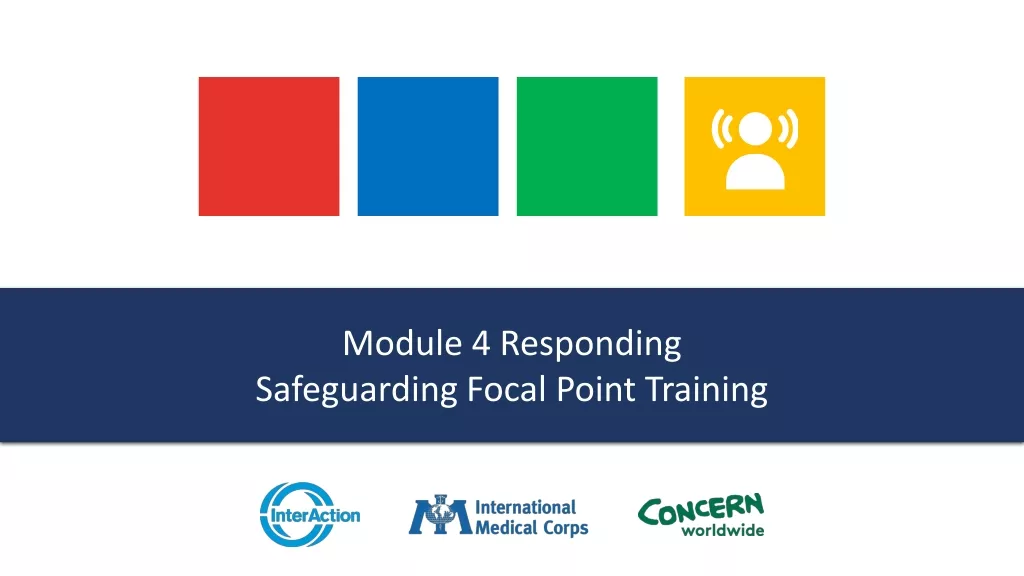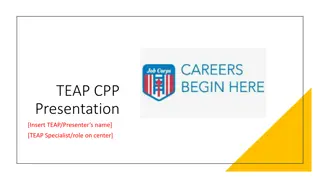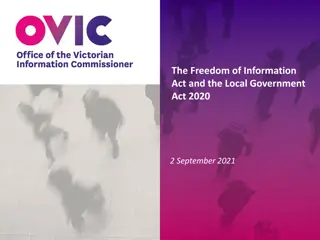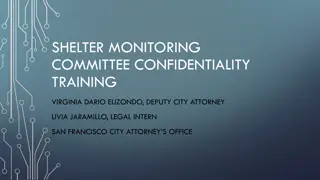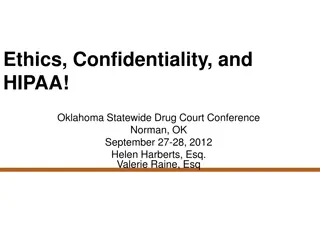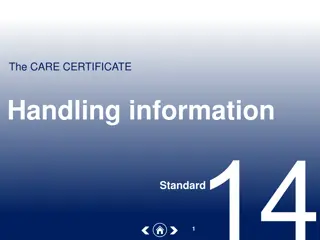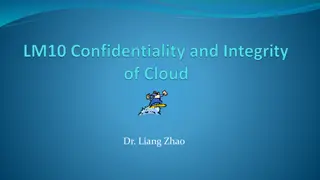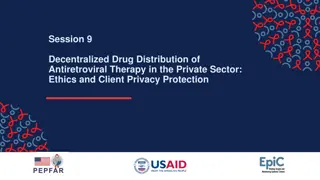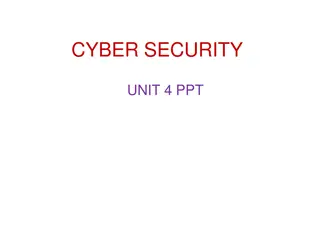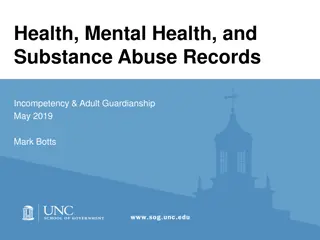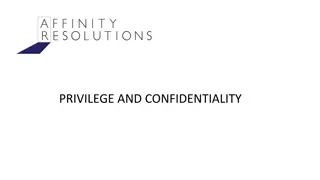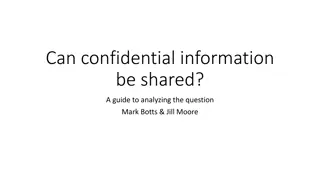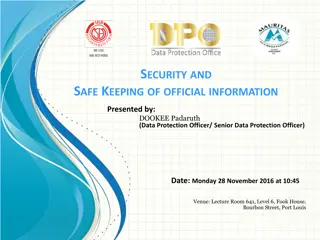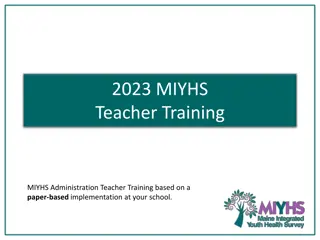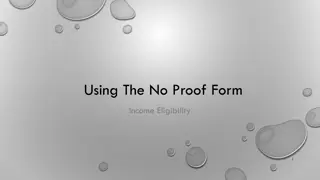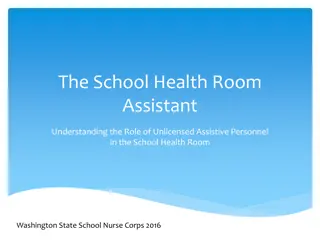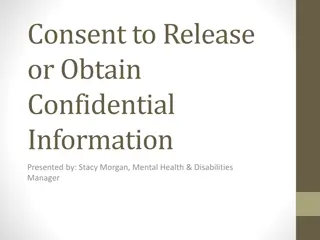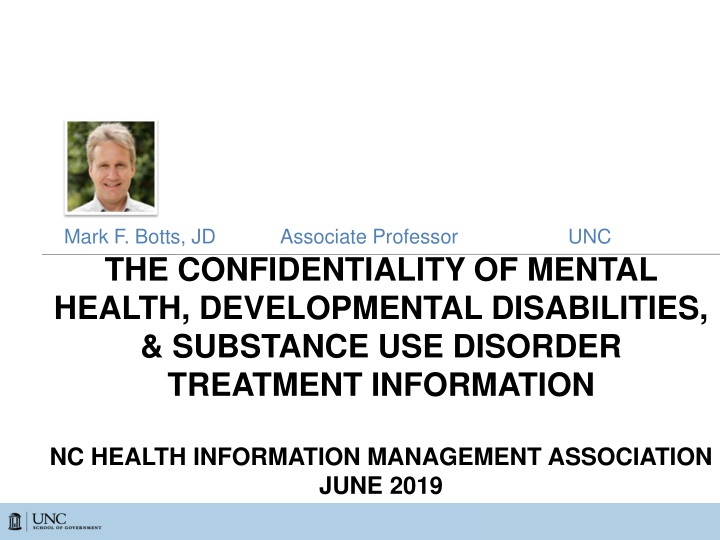
Confidentiality Laws in Mental Health and Substance Use Treatment
Explore the importance of confidentiality laws in mental health, developmental disabilities, and substance use disorder treatment. Learn about applicable federal and state laws, terminology, and the duty of confidentiality. Discover who is covered by these laws and what information is protected. Dive into the Privacy Rule and the responsibilities of covered health care providers.
Download Presentation

Please find below an Image/Link to download the presentation.
The content on the website is provided AS IS for your information and personal use only. It may not be sold, licensed, or shared on other websites without obtaining consent from the author. If you encounter any issues during the download, it is possible that the publisher has removed the file from their server.
You are allowed to download the files provided on this website for personal or commercial use, subject to the condition that they are used lawfully. All files are the property of their respective owners.
The content on the website is provided AS IS for your information and personal use only. It may not be sold, licensed, or shared on other websites without obtaining consent from the author.
E N D
Presentation Transcript
Mark F. Botts, JD Associate Professor UNC THE CONFIDENTIALITY OF MENTAL HEALTH, DEVELOPMENTAL DISABILITIES, & SUBSTANCE USE DISORDER TREATMENT INFORMATION NC HEALTH INFORMATION MANAGEMENT ASSOCIATION JUNE 2019
Applicable Confidentiality Laws Federal law governing substance abuse programs 42 CFR Part 2 State law governing MH/DD/SA providers GS 122C Federal law governing health care providers 45 CFR Parts 160, 164 (HIPAA Privacy Rule) 2
Terminology State MH Law____________Rule___________Law_______ Privacy Substance Abuse client individual patient facility covered entity program consent authorization consent confidential information protected health identifying patient information information
Is the Information Confidential? To know when these laws apply, you must know: Who is covered by the law? What information is protected? What is the duty of confidentiality?
Privacy RuleCovered Health Care Providers Any health care provider that transmits any health information in electronic form in connection with a HIPAA transaction
Privacy RuleProtected Health Information PHI is any information created or received by a health care provider or other covered entity that identifies an individual and relates to the physical or mental health of an individual, the provision of health care to an individual, or payment for the provision of health care to an individual
Privacy RuleDuty May use and disclose PHI only as permitted or required by the privacy rule A use or disclosure that is not permitted or required by the rule is prohibited Must implement reasonable safeguards (policies and procedures, training, technical, physical) to protect the privacy of PHI
State Mental Health LawGS 122C Covered Providers ( Facility ) Any individual, agency, or company at one location whose primary purpose is to provide services for the care or treatment of mental illness, developmental disabilities, or substance abuse Psychiatrists, pyschologists, licensed clinical social workers, licensed professional counselors Pyschiatric hospitals LME-MCOs and their contracted providers
State Mental Health Law Confidential Information Any information whether recorded or not relating to an individual served by a covered provider and received in connection with the performance of any function of the provider
State Mental Health LawDuty No individual having access to information that is confidential under G.S. 122C may disclose it except as authorized by G.S.122C-53 through G.S. 122C-56 (and its implementing regulations). G.S. 122C-52. See also 10A NCAC 26B (APSM 45-1) No individual
The Case of Jackie Jones Court orders Jackie to mental health treatment at Acme Counseling Center as part of a plan to see if she might regain custody of her children. Jackie authorizes Acme to share patient information with DSS to provide DSS with the information it needs to determine if I have made sufficient progress in treatment so as to regain custody of my children. Must DSS follow G.S. 122C confidentiality with respect to Jackie s mental health treatment information received from Acme?
The Case of Jackie Jones Jackie receives mental health treatment at Acme Counseling Center. Jackie is also receiving pregnancy services from Coates County Public Health Department. To coordinate care and treatment, including prescribed medications, Acme discloses information to to Coates Public Health. Must Coates County PH Department follow G.S. 122C confidentiality with respect to Jackie s mental health treatment information received from Acme?
State Mental Health LawDuty Noindividualhaving access to information that is confidential under G.S. 122C may disclose it except as authorized by G.S. 122C and its. Provided, however, a HIPAA covered entity or business associate receiving confidential information that has been disclosed pursuant to the confidentiality provisions of G.S. 122C may use and disclose such information as permitted by the HIPAA Privacy Rule. G.S. 122C-52(b)
Permitted Mental Health Disclosues to a HIPAA Covered Entity Pursuant to a patient authorization that complies with 10A NCAC 26B. G.S. 122C-53(a). Pursuant to opt-out authorization: Any facility may share client information with a HIPAA covered entity when necessary to coordinate care and treatment or to conduct quality assessment and improvement activities if the client is informed of the right to opt out of these disclosures and does not object in writing or sign a non-disclosure form provided by the facility . G.S. 122C-55(a7). 14
Federal Law Governing SUD Records 42 C.F.R Part 2 Restricts the use and disclosure of patient information obtained by a federally assisted alcohol or drug abuse program 15
Substance Use Disorder A cluster of cognitive, behavioral, and physiological symptoms indicating that the individual continues using the substance despite significant substance-related problems such as impaired control, social impairment, risky use, and pharmacological tolerance and withdrawal. (Does not include tobacco and caffeine.) 42 C.F.R. 2.11 16
ProgramDefinition One An individual or entity (other than a general medical facility) that provides and holds itself out as providing SUD diagnosis, treatment, or referral for treatment. A private practitioner who provides, and holds herself out as providing, diagnosis and referral for treatment is covered by the regulations even though she does not treat SUD. 17
ProgramDefinition Two An identified unit within a general medical facility that provides and holds itself out as providing SUD diagnosis, treatment, or referral for treatment If a general hospital has promoted an identified unit, such as a detox unit, to the community as a provider of such services, the identified unit, but not the rest of the general hospital, would be a program 18
ProgramDefinition Three Personnel in a general medical facility whose primary function is the provision of SUD diagnosis, treatment, or referral for treatment and who are identified as such Does not apply to hospital ED staff who refer a patient to the hospital s ICU for an apparent drug overdose unless the primary function of such staff is the provision of SUD diagnosis, treatment, or referral for treatment and they are identified as providing such services. 19
General Medical Facilities General medical facility is not defined in the rule. SAMHSA FAQ says may include: Hospitals Truama centers Federally qualified health centers Practice comprised of primary care providers 20
Question for Class Patient treated for an apparent drug overdose is transferred from ED to a medical floor. A substance abuse counselor visits and evaluates the patient for substance use disorder and possible referral for treatment. Is the substance abuse counselor a program under 42 C.F.R. Part 2? 21
General Medical Facilities Health care providers who work in these facilities would only be a program if they Work in an identified unit within the facility that provides and holds itself out as providing SUD diganosis, treatment or referral for treatment, or The primary function of the provider is the provision of such services and they are identified as providers of such services. 22
Question for Class Dr. Mallory is an addictions specialist who works in a community health center that provides primary care, pregnancy care, and geriatric care. Dr. Mallory treats patients who have substance use disorders and prescribes buprenorphine for opiate addiction as part of her practice. Is Dr. Mallory covered by 42 C.F.R Part 2? Is the community health center covered? Adapted from Legal Action Center, 9-19-13 webinar, Karla Lopez, attorney 23
Question for Class Hospital ED treating a trauma patient performs a blood test that identifies cocaine in patient s blood Does this make the hospital ED a program under 42 C.F.R. Part 2? Are the drug test results protected by 42 C.F.R. Part 2? 24
Covered Information42 CFR 2.12(a) Restrictions on disclosure apply to any info that would directly or indirectly identify a patient one who has applied for or been given SUD diganosis, treatment, or referral for treatment at an SUD program as having or having had a substance use disorder, and is drug or alcohol abuse information obtained by a program for the purpose of treating a substance use disorder, making a diagnosis for that treatment, or making a referral for that treatment 25
Question for Class CPS worker investigating report of child abuse or neglect requests access to child s mental health record. Family/social history section of child MH record states that Mom, during intake of child, disclosed that she is hooked on pain pills. Is the information pertaining to Mom s opiate dependency information protected by 42 C.F.R. 2? 26
Drug Screens Referal for assessment A screen, pre- screen, drug test, or other preliminary screen to identify patients who may have alcohol or drug problems for the purpose of referring them to an SA specialist for evaluation and diagnosis is not covered by 42 C.F.R. 2. Referral for treatment Drug tests results used to diagnose and refer for treatment, or monitor compliance with treatment, are protected by 42 C.F.R. 2. 27
Question for ClassSBIRT Dr. Smith is a primary care physician. At every physical she spends 5 minutes asking the patient a list of universal screening questions for risky substance use. If patient meets criteria for risky use, Dr. Smith has a short discussion with patient and, if appropriate, provides a referral for further assessment and possible treatment. Smith includes SBIRT screening results in her patient s records. Are the SBIRT screeing results protected by 42 C.F.R Part 2? Adapted from Legal Action Center, 9-19-13 webinar, Karla Lopez, attorney 28
42 CFR Part 2Duty Prohibits any use or disclosure that is not expressly permitted by the regulations No state law may authorize or compel a disclosure prohibited by the federal law
The Case of Jackie Jones Court orders Jackie to get drug treatment at Acme Drug Treatment Center as part of a plan to see if she might regain custody of her children. Jackie authorizes Acme to share patient information (attendance, progress, urinalysis results, and prognosis) with DSS and the court to provide DSS and the Court with the information they need to determine if I have made sufficient progress in treatment so as to regain custody of my children.
The Case of Jackie Jones 1. A law enforcement officer requests information about Jackie from Acme. Officer explains that he is conducting a criminal investigation related to Jackie s abuse of her children. Can Acme comply with the officer s request? 2. Instead of going to Acme, the officer goes to DSS and requests information about Jackie that DSS has received from Acme. The officer explains that he is conducting a criminal investigation of Jackie. Can DSS comply with the officer s request?
42 CFR Part 2Applicability of Disclosure Restrictions Restrictions on disclosure apply to Programs Lawful holders of patient identifying information those who receive covered information from a program and who are notified of the restrictions on disclosure. 42 C.F.R. 2.32
42 CFR Part 2Applicability of Use Restrictions Any information that is SUD information obtained by a covered program for the purpose of treating substance abuse, making a diagnosis, or making a referral for treatment Cannot be used to criminally investigate or prosecute a patient without a court order authorizing the disclosure and use of the information for that purpose Applies to anyone who obtains the information from a program regardless of the status of the person or how the information was obtained 42 C.F.R. 2.12
Is the Information Confidential? To know when these laws apply, you must know: Who is covered by the law? What information is protected? What is the duty of confidentiality?
When Can You Disclose It? To legally disclose confidential information, you need either a law patient authorization, or court order that permits or requires disclosure under the particular circumstances 35
Disclosures Required by Law
NC Disclosures Required by Law Reporting child abuse, neglect, dependency GS 7B-301 DSS assessment of abuse, neglect, and dependency report GS 7B-302(e) Child guardian ad litem access to info GS 7B- 601(c) Designated agency sharing in child welfare and juvenile cases G.S. 7B-3100, 14B NCAC 11A.0301 The federal regulations prohibit any use or disclosure of patient records that is not permitted by the regulations 37
Disclosures Required by Law State law A facility shall disclose confidential information as required by other state or federal law GS 122C-54(h) HIPAA A covered entity may disclose PHI to the extent the disclosure is required by law 45 CFR 164.512(a)
42 CFR Part 2 There is no catch-all provision permitting the disclosure of information when required by other law Patient records may be disclosed or used only as permitted by these regulations. 2.13 No state law may authorize or compel any disclosure prohibited by these regulations. 2.20 Where state law authorizes or compels a disclosure not permitted by 42 C.F.R. 2, the federal prohibition on disclosure stands.
Federal SUD LawTwo Permitted Disclosures When Required by Law Permits programs to disclose patient identifying information relating to the cause of death under laws requiring the collection of death or other vital statistics or permitting inquiry into the cause of death 42 CFR 2.15(b) when necessary to comply with state law requiring the reporting of child abuse or neglect 42 CFR 2.12(c)(6)
Notice of Privacy PracticesBasic Content Elements Uses and disclosures Individual rights Covered entity s legal duties and Complaint procedure Contact name and number Effective date of the notice
Notice of Uses and Disclosures A description of 1. The types of disclosures for TPO that do not require authorization--and one example of each 2. Each of the other purposes for which a disclosure is permitted or required without patient authorization 3. The types of disclosures that require patient authorization For 1. and 2., above 1. If a disclosure for any purpose described is prohibited or materially limited by other applicable law, the description must reflect the more stringent law 2. Sufficient detail to place the individual on notice of the uses and disclosures permitted/required by the Privacy Rule and other applicable law
Dont Use A Generic NPP for Behavioral Health Services The Privacy Rule permits disclosures that are not permitted by G.S. 122C and 42 C.F.R Part 2: When law enforcement requests info for identifying or locating a suspect, fugitive, witness, or missing person about an individual who is suspected to be a victim of a crime 164.512(f) In response to a subpoena
Notice of Privacy Practices Any facility may share client information with a HIPAA covered entity when necessary to coordinate care and treatment or to conduct quality assessment and improvement activities if the client is informed of the right to opt out of these disclosures and does not object in writing or sign a non-disclosure form provided by the facility. G.S. 122C-55(a7)
Subpoenas and Court Orders
Subpoenas HIPAA privacy rule permits disclosure in response to a subpoena. 45 CFR 164.512(e) State law governing MH/DD/SA information (G.S. 122C) does not permit disclosure in response to a subpoena Federal law governing SUD treatment information does not permit disclosure response to a subpoena
SubpoenasG.S. 122C; 42 C.F.R 2 Basic rule applies: disclosure is not permitted unless: A court orders disclosure The client consents to disclosure, or The applicable confidentiality law makes an exception to confidentiality that applies to the particular circumstances
Court Orders122C and HIPAA GS 122C-54(a) requires a facility to disclose in response to a court order HIPAA, 45 CFR 164.512(e), permits a covered entity to disclose in response to a court order Neither law expresses any particular procedure, standard, or findings
Court OrdersEvidentiary Privileges GS 8-53.3, et seq. A court may compel disclosure of privileged information if, in the court's opinion, disclosure is necessary to the proper administration of justice

